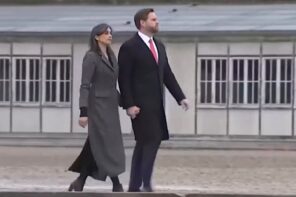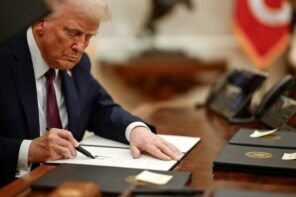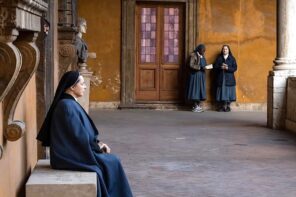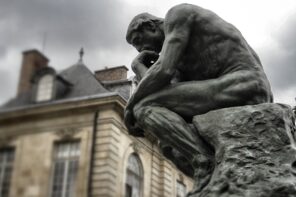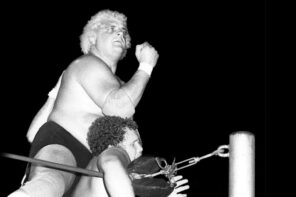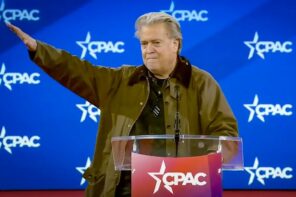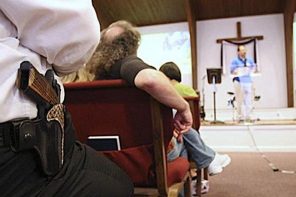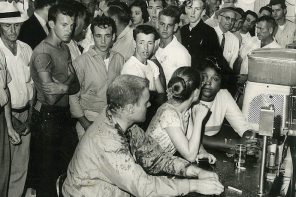Pass by Brown Memorial Baptist Church on a Sunday morning and you’ll hear a powerful sound. In between the spirituals—sorrow songs sung over a joyful rhythm section—you’ll hear Rev. Clinton M. Miller’s voice, rising over his microphone’s threshold, calling out through the static to responses from the packed pews.
Mixed in all that, these days, you’ll probably hear something about Barack Obama, or at least his echoes—”hope,” “politics as usual,” “change.” Keep walking, past the humbler Progressive Glorious Church of God in Christ, and there is a man on his stoop selling t-shirts with the big, colorful face of you-know-who on the front.
“This is Obama territory,” says Miller.
Though a century ago it was the site of an affluent white congregation, Brown Memorial is now almost entirely African American and lower to middle class. That’s how things have gone in the Clinton Hill neighborhood of Brooklyn. Today, longtime residents are being displaced by condominiums (now left empty by the economic downturn), or young professionals still working their way up to Manhattan. The church is learning to stay “relevant” to the changing community. For Rev. Miller, relevance means “meeting human needs” across lines of class and race.
Miller looks younger than most of his flock. He preaches in the “prophetic” style but outside the service radiates concern and patience. In both guises, the man is eloquent. Born and raised in Brooklyn, he took his divinity degree at Yale, followed by time alongside acolytes of Obama’s incendiary former pastor, Jeremiah Wright. Next February, Dr. Wright is slated to preach here. But Miller doesn’t like to carry ideological baggage. Micah 6:8 is all the theology he will admit to at first—do justice, love mercy, and walk humbly with your God.
On the night of the first presidential debate, Brown Memorial’s Progressive Adults for Christ hosted an event at a trendy bar around the corner. A small donation at the door took care of finger-food laid out in the back, and the several dozen who came were enough to fill the place. They were mostly Brown Memorial people, plus a city councilwoman and entourage, but younger than the Sunday morning crowd. After some back-and-forth to turn the channel off FOX, the debate got started and everyone hushed to listen. Except for cheers after Obama’s straight-faced retorts, the room stayed quiet.
At the end, activist Adrianne Shropshire took the mic and asked, rhetorically, “Who won?”
First came the true believers. Obama was “polished and poised,” one said. “So intellectual and so deliberate.” But soon other voices came out. One by one, people stood to make their speeches, confident as in the presence of friends.
“This is not an academic ivory tower!” Rather, “We need to see the strength. Enough of the poise. We need to see you put up your dukes sometime.” People agreed.
Another defended Obama. “His anger was there,” she said, “but he didn’t mudsling.”
“He can show strength without exploding.” To that the room exclaimed together, “He did!” This exchange went on a few more minutes.
Then a woman rose to speak. Obama “had the biggest hill to climb. He’s a black man.” The Republicans know what an angry black man on TV will look like to some voters. “They were trying to draw it out of him.” The room applauded in agreement. “We can’t look at it through our glasses,” added another. When Obama is preaching, they’re the choir. The undecided center who would make or break the election was anything but Brown Memorial.
People took their turns, and by the end, nearly everyone had been heard. Ms. Shropshire added some final remarks. “I just feel so good,” she said. “For the first time in my life, our voices count. We matter. I’m so glad I’m here.” On the way out, there were voter registration forms and groups preparing to go canvass in Philadelphia.
Afterward, when asked why she organized the event, Ms. Shropshire took a different approach than at the mic. The excitement around Obama’s candidacy, she hopes, will end up energizing people to be more active locally in the future. Here, work needs to be done, and “it is all about the issues.”
Rev. Miller, who arrived just in time to make some closing statements, had a similar message. We all know who we’ll be voting for, he said. So it is time to think about the next steps with Obama as president, about “pushing the urban agenda.” For Miller that means affordable housing, small businesses, and reform in the government’s faith-based initiatives program, where he sees “a tendency against prophetic churches.” If you don’t preach the administration’s foreign policy, your work for the poor doesn’t get money.
Brown Memorial’s neighborhood has the right to a certain sense of entitlement. Clinton Hill, and Fort Greene to the northwest, delivered overwhelming support to Obama in the Democratic primary. Urban communities around the country in general are his base. And as someone who worked as an organizer on Chicago’s South Side, he seems liable to actually remember.
The night before the debate, a smaller, more elderly group gathered in a room in Brown Memorial’s basement, the Democratic organization for the local district. Faye Moore, of the Social Services Union, and Al Vann, a city councilman, spoke about Barack Obama in no uncertain terms.
In Obama, Ms. Moore declared, “we see a candidate who says everything we want to hear. He continues to speak progressive truth to power.” As a local labor leader, she was disappointed that the national unions hadn’t expressed more enthusiasm after Hillary Clinton and John Edwards were out of the race.
“The Bush years have destroyed our cities,” she continued. Public housing has disappeared “in the middle of the night.” Not anymore, if Obama wins. “Barack Obama represents the change that’s going to benefit us.”
From the moment he arrived at the meeting Mr. Vann was a hard man to miss. He is a giant with a gentle presence. Between his crisp suit-jacket and his collar and tie, Vann wore a t-shirt with the civil rights slogan, “I am a man.” Showing it off, he said, “this is more important than being pretty.” His talk began with sad news about a neighbor who fell from a fire escape after being tazered by the police, unarmed. “A man is dead who should not be dead.”
After that, the news was all good. Vann had been a delegate at the Democratic National Convention in Denver. “I thank God I had the opportunity to go,” he said. “We never thought in our lifetime that we’d have a black man as president.” The room sighed and applauded. Many in the audience had lived in the Jim Crow South. The rest had seen racism enough up North. Recalling Obama’s climactic speech at Invesco Field, “He just rose to the occasion. All of this for a son of Africa, this brother of ours!”
“Do you remember how we got here?” From their chairs people called out, “In chains.”
“All of us are going to get to make history by casting our vote,” Vann beamed. “I’ve never felt so certain that something is going to happen.” And for him, there was no doubt about trusting Obama. “He’s a black man. He’s been sending all sorts of signals.”
According to Rev. Miller, talk about Obama’s blackness stays quiet—he keeps his own concerns to a small circle of fellow pastors. “At his inauguration, he will not be able to say, ‘My great-great-grandmother was a slave.’ That’s not his speech. I just hope America will realize that until that speech is made, it still has a ways to go as far as dealing with the dynamic of race in this country.”
At the basement meeting, organizers handed out information about laws that could be used to prevent people from voting. “They’re going after the minority vote,” they warned.
Such fears are hardly unfounded. Just this year, the Supreme Court upheld a decision that requires a government-issued ID in order to vote in Indiana. Though ostensibly meant to combat voter fraud, the law has drastic implications for minorities, who are much more likely not to have passports or driver’s licenses. Similar reforms throughout the country, justified by the “hanging chads” of 2000, have opened the door for regulations that effectively disenfranchise poor urban communities.
Meanwhile, pundits murmur about the so-called “Bradley Effect,” named after a black Los Angeles mayoral candidate who lost his election after leading in the polls. As the explanation goes, people won’t admit their racism to an opinion pollster, but it comes out at the last minute, in the voting booth.
“It’s not going to be easy,” warned Vann, “because nothing is easy for us in this country.” Still, “We have continued to make progress against great odds because we are a great people.”
Near the end of the meeting, an older woman in front stood up and turned to the others with something serious to say. “It’s definitely divine intervention,” she testified. “This is something divine, like a King or Gandhi. Only once in a lifetime do you see someone like this.” A big smile came onto her face. “I can’t wait for the inaugural ball in Washington!” Everyone laughed out loud, dancing in their seats.
Rev. Miller, or a part of him at least, can’t help but agree. “I do believe there is something providential at work,” he says. “How do you plan millions of people to come out? None of us are that good. He’s not that good. He’s good, but there’s something else. Every now and then it happens, and it can’t be explained.” Miller stops there. “I think it is providential, but I think we’ve got to be careful not to extend that to the messianic. That becomes very dangerous.”
Again, for emphasis, “Providential, but not messianic.”
